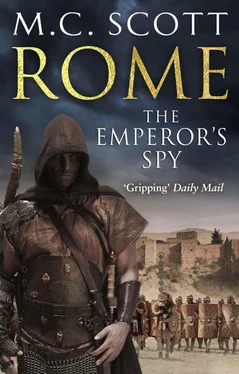M. Scott - Rome - The Emperor's spy
Здесь есть возможность читать онлайн «M. Scott - Rome - The Emperor's spy» весь текст электронной книги совершенно бесплатно (целиком полную версию без сокращений). В некоторых случаях можно слушать аудио, скачать через торрент в формате fb2 и присутствует краткое содержание. Жанр: Исторические приключения, на английском языке. Описание произведения, (предисловие) а так же отзывы посетителей доступны на портале библиотеки ЛибКат.
- Название:Rome: The Emperor's spy
- Автор:
- Жанр:
- Год:неизвестен
- ISBN:нет данных
- Рейтинг книги:3 / 5. Голосов: 1
-
Избранное:Добавить в избранное
- Отзывы:
-
Ваша оценка:
- 60
- 1
- 2
- 3
- 4
- 5
Rome: The Emperor's spy: краткое содержание, описание и аннотация
Предлагаем к чтению аннотацию, описание, краткое содержание или предисловие (зависит от того, что написал сам автор книги «Rome: The Emperor's spy»). Если вы не нашли необходимую информацию о книге — напишите в комментариях, мы постараемся отыскать её.
Rome: The Emperor's spy — читать онлайн бесплатно полную книгу (весь текст) целиком
Ниже представлен текст книги, разбитый по страницам. Система сохранения места последней прочитанной страницы, позволяет с удобством читать онлайн бесплатно книгу «Rome: The Emperor's spy», без необходимости каждый раз заново искать на чём Вы остановились. Поставьте закладку, и сможете в любой момент перейти на страницу, на которой закончили чтение.
Интервал:
Закладка:
Seneca shot him a startled glance. ‘How did you know?’
‘The Phoenix Year is Alexandrian, not Gaulish. In the entirety of Coriallum, only half a dozen people at most hail from the east and of those only two have the initiative and courage to speak to you. One is Hannah, physician to the Green team. On balance, I thought it unlikely to be her.’
‘Nevertheless, she’s an exceptional woman,’ Seneca murmured. ‘Sorely wasted on the Gauls.’
‘I doubt if they see it that way,’ said Pantera. ‘Turn right through the gate here. I’ve paid for a room and unlocked the shutters
… the green ones on the left.’
The shutters were palely painted, new and neat. They opened smoothly, and clipped back against the white wall. Seneca leaned inside to take stock of the small room.
‘You know Shimon led the Sicarioi after the Galilean’s death?’ he said. ‘He’ll cut our throats and leave us dead if he thinks this is a trap.’
‘Then perhaps it’s as well that I sent for him in your name, with promises of safe-keeping,’ Pantera answered. ‘Is he tall, with a thin face and white hair?’
‘You’ve seen him?’
‘He was making his way along the harbour front when I left. If Goro’s boys are good enough, he’ll be here to meet us soon. I suggest we go in through the window; there’s less chance of being seen that way.’
One after the other, they climbed in through the open window. The room was clean and sparse, scented with thrown thyme and fresh straw, with a bucket in one corner and shuttered windows to both front and back. The bed was low and narrow, its straw pallet big enough only for two adults if they lay on their sides, or one atop the other. Seneca sat on it, rubbing his hands free of the faint aroma of goat.
Pantera positioned himself with his eye to the shutter at the front, watching a flock of gulls mob a boat coming into dock. Along the harbour front, four of Goro’s boys similarly circled a merchant waiting at the dockside who had made the mistake of letting his wealth show. Shimon the zealot, tall, barefoot and considerably less foolish, passed through them like a blade through cheese, and came away unscathed. Moments later, he tapped on the door of the room, and was admitted.
Seen close up, he was as old as Seneca, but the pressures of life had worn him more thoroughly. His hair, though plentiful, was the white of old snow as it rots in spring, flat and greyly stained in places with the colours of his earlier life.
He was dressed in a much-travelled linen robe, undyed and tied at the waist with a cord of the same material. His bare feet were hard as hooves from a lifetime’s unshod wanderings. The olivewood staff on which he leaned was old and notched where it had been used to effect against blades that might have sought its owner’s life. If he carried up his sleeve the infamous Sicari blade with which to cut the throats of apostates, Pantera could not see it.
Shimon leaned back against the closed door and took out a battered cloth from his belt to wipe the sweat from his face. From behind it, only a little muffled, he said, ‘My lord Seneca I know. You… I could not name?’
He asked his question in Greek, language of all civility. In Aramaic, language of his youth, Pantera answered, ‘I am Sebastos Abdes Pantera, Lion of Mithras, honoured to meet you, although it is not the first time.’
He had not intended to mention it, but the memory of a pebble thrown in a dawn-lit garden was so vivid that it occupied the whole of the small room, and could not be ignored.
Shimon let his kerchief fall. ‘Your father,’ he said slowly, ‘would be proud of his son who has become a friend of Seneca’s. And perhaps more?’
Seneca was looking out of the back window. Without turning, he said, ‘He is my foster-son. Best of all the men I trained. And was made a citizen of Rome by the emperor yesterday morning.’
‘My lord has ears in the most unlikely of places,’ said Pantera. ‘And he is overly kind. I am an agent of limited means and I doubt very much if my father would have been proud of what I have become.’
Shimon eyed him with wry amusement. ‘I’m sure your father was a good man,’ he said. ‘He will know your heart and see it good. In his honour, then, we meet. You should know that I was followed on my way here. It will surprise them that I have come to a whorehouse, but it may not prevent them from coming inside.’
He joined Seneca at the window. ‘This courtyard is not easily overlooked. If we were to leave the way you came in — I am correct, yes? — then we could avail ourselves of the warren of small lanes behind here. I am the eldest among us. If I undertake not to slow down our party, perhaps we could leave behind the slothful idiots who think to set themselves against us?’
It was a challenge, however diffidently made. Pantera let Seneca catch his eye. The philosopher was already kilting up his tunic, tucking the long ends into his belt.
‘By all means,’ he said. ‘If we three can’t outfox Akakios’ agents, we deserve all that he can visit on us. Shall we go?’
Shimon might have been the oldest, but he did not need his staff to climb out of the small window, nor, afterwards, to follow soundlessly as Pantera led them down the alley that ran behind the inn and thence, via a potter’s shed, a baker’s courtyard with an uncovered well and long pans of dough souring in the afternoon sun, and a weaver’s shop displaying vats of green and yellow dye, to the western edge of town where the magistrate, his two brothers and his many cousins had their houses.
A little breathless, they paused in the angle between two high walls, with three streets leading away and an orchard behind. Apples and pears drooped and swayed above them, and wild doves called. The hubbub of the dock was no louder than the sea, the sound smothered by fountains and distant, well-bred laughter.
Seneca was enjoying himself, hopping from one foot to the other, his head flicking three ways at once, checking each of the streets at whose intersecting corner they had paused. Shimon kept in the shadows with the smallest of the walls at his back, and his olive staff angled so that he could use it equally as a weapon or as a means of pushing himself over the wall. When nobody appeared to be following, he turned to Pantera.
‘My host owns this house,’ he said. ‘I came from here less than an hour ago.’
‘I know. And so the last thing they’ll expect is that we’ll come back, which may buy us some time. We won’t stay long, but I think we all three need to look at this.’
Watching both men, Pantera drew from within the fold of his belt the slip of papyrus Nero had given him in the morning and spread it flat against the wall in a leaf-dappled band of afternoon sun.
Shimon sighed a long-held breath. Squinting a little, he leaned forward. ‘Where did you come by this?’
‘Nero gave it to me,’ Pantera said. ‘It’s a copy of a copy that was taken from a Syrian who had it in turn from an apothecary-astrologer with ink-stained fingers who works out of the Black Chrysanthemum tavern in the Street of the Lame Lion in Alexandria. You now know as much as any of us does, although it may be that other copies were sold before our hapless Syrian made the mistake of trying to sell one to Akakios. Have you seen it before?’
‘No. I have hunted across nine nations for this and had given up hope of finding it.’ He held out his hand. ‘May I?’
‘Of course.’
Shimon held the note at arm’s length, the better to see it with his ageing eyes. He became a harder man as he read. His fingers whitened on the text, his breathing slowed. At the end, he laced his fingers together, and said softly, furiously, ‘“ Then shall the veil be rent, never to be repaired.”’ He spoke in Hebrew. The papyrus was written in Greek. The new language was itself an answer to one of their questions.
Читать дальшеИнтервал:
Закладка:
Похожие книги на «Rome: The Emperor's spy»
Представляем Вашему вниманию похожие книги на «Rome: The Emperor's spy» списком для выбора. Мы отобрали схожую по названию и смыслу литературу в надежде предоставить читателям больше вариантов отыскать новые, интересные, ещё непрочитанные произведения.
Обсуждение, отзывы о книге «Rome: The Emperor's spy» и просто собственные мнения читателей. Оставьте ваши комментарии, напишите, что Вы думаете о произведении, его смысле или главных героях. Укажите что конкретно понравилось, а что нет, и почему Вы так считаете.












